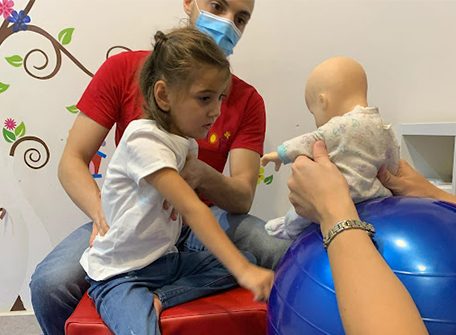Generally speaking, rehabilitation helps individuals achieve independence, the highest level of function, and living standards. Rehabilitation does not reverse or repair the damage caused by trauma or disease; instead assists the child in restoring health.
With Intensive Rehabilitation, your children will remain in the hospital while focusing their daily routine on therapy. Rehabilitation includes physical, occupational, speech therapy and individual sessions with psychologists and specialists.
Main Objectives of Intensive Rehabilitation Tapering the youngster for the exercises or chores. This innovative and successful strategy enhances balance, functional skills, stamina, and muscle strength so that the kid can make basic bodily motions such as standing, sitting, kneeling, walking, and so on with minimal aid and support.
Benefits of Intensive Therapy
Intensive therapy covers various topics, including lip-reading, relaxation, oral skills, relationships, stability, and other services. As a parent, you will have the opportunity to:
Conditions That Can Benefit From Intensive Therapy
- Neurological Conditions
One of the most common diseases that may necessitate significant rehabilitation involves neurological problems. This category encompasses a variety of conditions that can benefit from a rigorous intensive therapy program.
It’s vital to remember that with neurological problems, the more you practice the activities with your kids, the more their brains will learn about them. Intensive therapy can help your child acquire new tasks and motor abilities faster and accelerate their recovery.
- Parkinson’s Disease (PD)
Parkinson’s disease is one of the most common movement disorders globally. It is a progressive brain disorder with symptoms that worsen over time, affecting the individual’s ability to walk and maintain balance. There are no known therapies for this disease; however, physical therapy and exercise can benefit its management. Children with Parkinson’s disease may require extensive physiotherapy at different stages in their treatment to get them on the right track.
- Pediatric Stroke
An intense therapy program for children suffering from pediatric stroke can help begin recovery. Intensive therapy takes 2 to 3 weeks on average, depending on the patient’s demands and circumstances. The following are the general goals of intensive stroke treatment programs:
- Working on relearning motor skills
- Preventing future complications or issues that may arise post-stroke
- Assisting the patient in becoming as much independent as possible
- Providing treatment and practices to rewire the brain
- In the case of children, the activities utilized for intense rehabilitation are exciting and engaging, intending to achieve the same results but differently.
- Traumatic brain injury/injuries to the head
Patients suffering from traumatic brain injury or head injuries may benefit from intensive therapy. Depending on the type of injury, intensive therapy might last two to three weeks and can be an excellent approach for the patient to start the recovery process.
- Cerebral Palsy (CP) in Children
Intensive therapy strategies for children with CP are commonly employed around the world. Children with CP have motor planning and motor learning problems, and intense therapy can benefit their treatment. However, intense therapy programs for children are very different from adults’.
The activities done with children in this treatment method involve fun games that improve the child’s engagement. In the case of youngsters, it is advantageous to schedule a therapy plan during the child’s school vacation to get the most out of their treatments.
The Bottom Line
A rigorous rehabilitation program improves muscular strength and function and reduces pain, and the benefits last for several months after the program is completed.
We at Hope AMC offer cutting-edge intensive therapy programs to address specific conditions of kids. Our 3-week intensive therapy program is available every week, with five daily sessions for three weeks in a row. During these therapy sessions, many children make rapid and commendable progress, exceeding all expectations. In these therapy sessions, various proven techniques are used, and as a result, children learn the skills much faster than in traditional therapeutic approaches.
Consult our expert therapist today.






